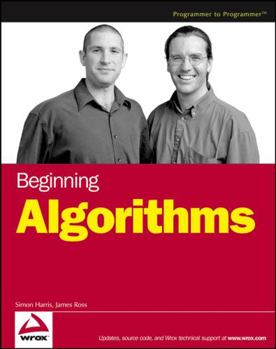Beginning Algorithms
Select Format
Select Condition 
Book Overview
Beginning Algorithms A good understanding of algorithms, and the knowledge of when to apply them, is crucial to producing software that not only works correctly, but also performs efficiently. This is the only book to impart all this essential information-from the basics of algorithms, data structures, and performance characteristics to the specific algorithms used in development and programming tasks. Packed with detailed explanations and instructive...
Format:Paperback
Language:English
ISBN:0764596748
ISBN13:9780764596742
Release Date:November 2005
Publisher:Wrox Press
Length:592 Pages
Weight:2.00 lbs.
Dimensions:1.3" x 7.5" x 9.1"
Customer Reviews
2 ratings
Important to have around for a couple of reasons...
Published by Thriftbooks.com User , 19 years ago
It's pretty easy these days to use a programming language and the high level of abstraction it can offer to avoid understanding certain programming fundamentals like lists, queues, and stacks. It's for sure that I've gotten away with it. But if you're just starting out in programming (or if you're trying to fill in some gaps), you might be interested in Beginning Algorithms by Simon Harris and James Ross. They do a nice job of making a complex subject approachable... Contents: Getting Started; Iteration and Recursion; Lists; Queues; Stacks; Basic Sorting; Advanced Sorting; Priority Queues; Binary Searching and Insertion; Binary Search Trees; Hashing; Sets; Maps; Ternary Search Trees; B-Trees; String Searching; String Matching; Computational Geometry; Pragmatic Optimization; Further Reading; Resources; Bibliography; Answers to Exercises; Index Harris and Ross take you through the basic programming algorithms using Java as the base language. Rather than just tell you "use this Java class to do a Hash", they explain the underlying concept and then have you build an implementation of that concept in code. After you've taken the time to write the methods and classes by hand, you'll end up with a pretty complete understanding of that algorithm in a way that just using provided classes can't offer. Another commendable point in this book is that they start off each algorithm coding exercise by building unit tests first. That way, you can be assured that the code you write does everything it's supposed to do, and further tweaks to improve the logic don't lead to the introduction of bugs. Very solid approach... I will end up keeping this book around for a couple of purposes. First, I'm sure to end up referring to it when I need to understand a certain fundamental like Soundex or searching. I'll get more out of this book and it's focus on practicality than I would out of some academic treatise on the subject. And second, if I have to code something related to one of these algorithms, I'll have some good example code to pull from. Can't ask much more from a book than that... If this is a weak point in your programming portfolio, getting a copy of this book to study and reference would be a good investment in your career.
the book's examples are in Java
Published by Thriftbooks.com User , 19 years ago
Neither the front or back cover says this, so I will. The source code examples in this book are all written in Java. I suspect the book is being a little coy about this because the authors want to maximise the potential audience. Fair enough. Granted, the text mentions Java immediately inside, but you have to actually open a physical copy, to see this. If you are already conversant in Java, that's great, because the book offers an indepth guide to several crucial classes. But what if you program in C++ or C#? In the Standard Template Library for C++ and in the default libraries for C#, you should be able to easily find the equivalent classes to those used in the text. Of course, you will then have to rewrite the examples that use those classes. Straightforward. None of the examples are long. And since this book is fundamentally about computations, and not about making a user interface, the syntax for using the system classes is roughly the same, across these languages. Also, some examples might use the object oriented property of extending a base class. As you can do this in C++ and C#, there is no problem here either. A problem might have arisen if the authors had used C++ with multiple inheritance, because Java and C# forbid this. But since they didn't, it's not an issue. As an OO language, Java is actually pretty minimal. Another way of looking at the topic of your language is that if you don't use Java, you can potentially use the book to better effect. Because you can't simply copy the Java code, then you have to actually get an accurate understanding of what it is doing, before manually recoding. The text covers the most common structures and methods for using those structures, that you are likely to need. Lists, stacks, iteration, recursion, queues, sorting, searching, hashing etc. Some of these subjects have immense depth. For example, sorting and searching takes up one volume of Knuth's "Art of Computer Programming". But that is a very advanced text, and ill suited to someone new to the basic algorithms. Harris and Ross give you enough complexity to be challenging and understandable. While perhaps giving some indications as to more intricate underlying issues. As alluded to above, if you proceed through the text, several important Java classes are used. Vector, List, Hashtable, HashSet and others. You would be well advised to gain fluency in these, as the book shows how they form the basis of much computational work. You also get an appreciation for the beauty of Java, inasmuch as it comes with those classes. While you could certainly write these from scratch, not having to do so is a huge timesaver. And by using the system classes, you are assured of very stable, highly debugged classes.





